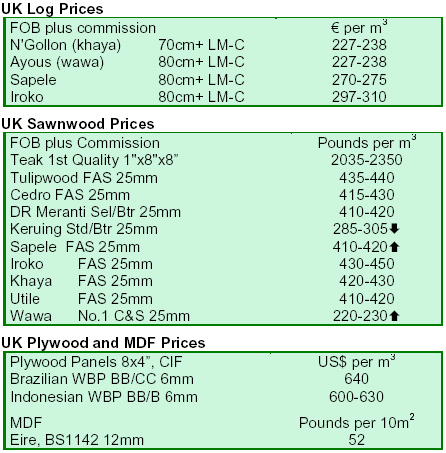|
Report
from the UK
Higher profits make Persimmon upbeat on housing market
Persimmon, the UK¡¯s largest house builder, revealed pretax profits for the first half of 2007 at GBP281.1 million
and sales worth GBP 1.51billion, reported BBC News. The profits rose 9.8%, and sales for the
second half of the year had already helped Persimmon reach 85% of its full-year
sales target. The company also said it expected the housing market to remain robust despite recent increases
in interest rates and welcomed the government¡¯s plans to expand the country¡¯s housing stock.
UK joinery sector remains strong with high demands
The TTJ reported that the joinery sector, one of the main areas of tropical hardwood use, is still filling
orders until the end of the year, with timber windows in good demand. The Confederation of British
Industries said manufacturers were showing strong demand, but demand for building
materials fell 11% in August. It was expected that this drop was due to summer holidays and little demand for
DIY.
Manufacturers express concern over availability and prices of timber species
Market concerns have been voiced by some manufacturers about the availability of timber species such as Keruing,
Sapele, Framire and Utile in the specifications required. Manufacturers are also concerned
about fluctuating prices for such species and at the attempt by some African
shippers to renegotiate prices for previously agreed contracts.

EUROPE
MARKET and Scandinavia
VPA negotiations yield mixed progress
EU Forest Watch reported progress in the EU Forest Law Enforcement Governance and Trade (FLEGT) Voluntary
Partnership Agreement (VPA) negotiations, saying thatbaseline principles had yet to be
established with timber producing countries. Specific elements being negotiated
with Indonesia, Malaysia and Ghana included a definition of legality, a legality assurance system and an independent
monitoring function. Although Ghana and Indonesia had established multi-stakeholder negotiating
teams, Malaysia had yet to further engage stakeholders. Nevertheless, Indonesia, Ghana and Malaysia had made some progress
in meeting the negotiating terms of the VPAs.
Agents anticipate abolition of Chinese exports subsidies
The latest issue of EUWID reported on European agents¡¯ anticipation that China would abolish its
export subsidies for plywood and wood-based panel products. Importersexpected that the current 5%
subsidies would be abolishedat the start of September, although others had reported 23
September as the date on which the subsidies would be abolished. While the news would be sudden, importers
noted that Chinese plywood prices had unexpectedly changed when the Chinese government curtailed export
subsidies on 1 July.
The rumors about the abolition of subsidies have already led to increases in prices of Chinese plywood.
The price has increased over the last few months, since the 1 July change in export subsidies and the
higher production and material costs, raising prices by more than US$1,000/40
foot container alone. Due to rising prices, European importers have been searching for cheaper alternatives
from other countries, but the search has proved difficult.
In addition to the abolishment of subsidies, some speculated that the price increases for plywood might havean impact on the EU anti-dumping investigation against
Chinese plywood. The price rise and the lack of government subsidies, some claimed, might take away the
merit of F¨¦d¨¦ration Europ¨¦enne de l¡¯Industrie du Contreplaqu¨¦ (FEIC) application to extend anti-dumping
duties to Chinese plywood. However, the Chinese Embassy denied the connection between the actions, and
the EU Commission declined to comment.
Importers blame SE Asian surplus for pressure on scantling prices
Sales prices for window scantlings remained under pressure, reported EUWID, which was affected by
the surplus of South-East Asian meranti scantlings. German traders had also reduced sales prices
because of lowdemand for and adequacy of existing stocks of meranti. As a result, production capacity in some areas of Southeast
Asia had been weakened. Another reason why importers were cutting back stocks was that they had received
inferior quality scantlings or wood products instead of the regular higher quality material they expected.
Yellow balau being exported in high quantities
TTJ reported that German importers have high stocks of yellow balau (bangkirai) in Germany. This is
due in partto: high levels of stocks ordered at the end of the gardenseason in 2006; the range of species available from South
American countries in the last few months; and the limited outflow of bangkirai
stocks, in part due to lower quality of stocks. As a result, fewer contracts are being concluded in
Southeast Asia and it is uncertain whether the market willpick up again in September.
Some importers note that the problems with high stocks and low outflow of products are due to supply
chain problems in Indonesia and other countries in South-east Asia. Some sawmills in Indonesia have
faced closure of their operations or are cutting back on stock due to low European demand. Regardless, Indonesian suppliers face
the need to increase prices, often times transferring the higher costs of the
product onto the importers, including by increasing shipping contracts. Yet, the Indonesian
suppliershave had limited success in these attempts.
|